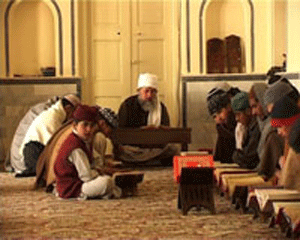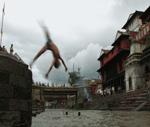This page is no longer being maintained.
For Immediate Release
Contact:
Leslie Weddell
(719) 389-6038
Leslie.Weddell@ColoradoCollege.edu
12 TOURING DOCUMENTARIES FROM SOUTH ASIA TO BE SHOWN
IN FREE TWO-DAY FILM FESTIVAL AT COLORADO COLLEGE
Films selected from 35 documentaries screened in competitive Kathmandu festival
COLORADO SPRINGS, Colo. – Feb. 18, 2011 – A two-day film festival featuring a dozen documentaries from South Asia will be held at Colorado College Feb. 26-27.
 The 12 films range from a portrait of girls escaping poverty and gaining self-esteem as players in Afghanistan's first ever women's national football team to an exploration of the madrassas in Pakistan to a retracing of Gandhi’s steps during the Dandi salt march to an examination of young Nepalese migrants in Qatar.
The 12 films range from a portrait of girls escaping poverty and gaining self-esteem as players in Afghanistan's first ever women's national football team to an exploration of the madrassas in Pakistan to a retracing of Gandhi’s steps during the Dandi salt march to an examination of young Nepalese migrants in Qatar.
Although the films cover a wide range of topics, they are all part of the prestigious Film South Asia (FSA), a festival of South Asian documentaries. The forum showcases the best documentaries made in the past two years on South Asian subjects.
The documentaries being shown at Colorado College are part of Traveling Film South Asia, a collection of the best films from the festival, selected to travel around the world in an effort to build awareness and empathy, create an understanding of the region and showcase the latest trends in documentary filmmaking in South Asia. They were selected from the 35 documentaries screened in the competitive section of Film South Asia ’09, the “mother festival,” held in Kathmandu in September 2009.
The first documentary will be shown at 1 p.m., Saturday, Feb. 26, and the final film begins at 8 p.m., Sunday, Feb. 27. All films are free and open to the public, and will be shown in the screening room at the Edith Kinney Gaylord Cornerstone Arts Center, 825 N. Cascade Ave., on the Colorado College campus. The showing of these films is sponsored by CC’s office of international programs and the Asian studies program.
The films are:
1 p.m., Saturday, February 26
Out of Thin Air — (50 minutes) India, 2009, directed by Samreen Farooqui and Shabani Hassanwalia. The Ladakhi film industry has been growing by leaps and bounds making 28 films in the last six years. But the lives of the locals involved in the films are not spent giving interviews and walking the red carpets. Instead, everyday people with fulltime jobs as restaurant owners, police officers and monks double as producers, directors and actors. “Out of Thin Air” takes viewers into the lives of these figures from local cinema, and provides a look into the Ladakh missing from postcards.
2 p.m., Saturday, February 26:
Afghan Girls Can Kick — (50 minutes) Afghanistan, 2007, director, Bahareh Hosseini. An intimate fly-on-the-wall portrait of teenage girls breaking the stereotypical mold set for them by a conservative society as they become players in Afghanistan’s first ever women’s national football team. “Afghan Girls Can Kick” follows the team during preparations for its first competitive international matches. Focusing on a few players, the film captures the journey from their youth under the harsh Taliban regime to life in today’s Afghanistan. Many members of the team speak of how football helps them envision the future in a country beset by insecurity and suicide bombings.
3 p.m., Saturday, February 26
Film: The Way of the Road — (60 minutes) Nepal, 2009, director, Ben Campbell & Cosmo Campbell. In 2012, a road through Nepal’s Rasuwa district will reconnect an ancient Himalayan trade route with global traffic. The film looks through Tamang villagers’ eyes at the cultural and economic interaction that flows through this borderland, including a dramatic re-enactment of Tibetan and Nepali armies in conflict. But what do the villagers whose lives it is intended to benefit think about the road?
4 p.m., Saturday, February 26
The Battle for Pakistan — (40 minutes) Pakistan, 2009, director, Maheen Zia. Do extremism and madrassas converge? What is the story behind the phenomenal growth of the madrassa network in Pakistan in recent years? Are the madrassas “nurseries for jihad” or do they make a positive contribution in a state that has all but abdicated its responsibilities? The mesh of global politics and the human story behind the Pakistani madrassa emerges in a film shot on a variety of locations.
 6 p.m., Saturday, February 26
6 p.m., Saturday, February 26
Children of God — (89 minutes) Nepal, 2008, director, Yi Seung-jun. At the crematorium at the Pashupatinath temple in Kathmandu, there are many whose livelihoods depend on the ritual of death. Among them are the children who live off the food and money drifting in the water after being used as offerings for the funerals. Aryaghat is a holy ground for the Hindus, but for these children it is playground, home and a place where they can earn a living. “Children of God” takes an in-depth look at the children who struggle to stay alive.
7:45 p.m., Saturday, February 26
The Salt Stories — (84 minutes) India, 2008, director, Lalit Vachani. Joint winner of the Second Best Film Award at FSA 2009. In 1930, a group of Indians led by a frail, elderly man marched 241 miles. Mahatma Gandhi was able to craft an anti-colonial, nationalist movement around a basic issue of livelihood: the right of Indians to make and consume their own salt. Almost eight decades later, the film retraces Gandhi’s steps, following the famous Dandi salt march trail in a film that focuses on the issues of livelihood in modern, globalizing India.
1 p.m., Sunday, February 27
Mayomi — (50 minutes) Sri Lanka, 2008, director, Carol Salter. Post-tsunami, Mayomi struggles for her family to gain independence while holding her troublesome family together in post-tsunami Sri Lanka. Having lost her soldier husband to the Tamil Tigers and her mother and home to the 2004 tsunami, Mayomi is the only female member left in her family. She single-handedly cares for her disabled father, her alcoholic brother and his abandoned 6-year-old son. Still homeless, she knows that this is unlikely to change in a country crippled by an inefficient bureaucracy and corruption.
2 p.m., Sunday, February 27, 2011
The Promised Land — (90 minutes) Bangladesh, 2008, director, Tanvir Mokammel. Joint winner of the Second Best Film Award at FSA 2009. A tale of statelessness spanning six decades and three countries, “The Promised Land” is about the 160,000-strong Urdu-speaking community of Bangladesh, living isolated lives in 116 camps across the country. The terms “Urdu-speakers,” “Non-Bengalis” and “Biharis” are used interchangeably to refer to the Muslim people who originally emigrated from India to the newly created East Pakistan in 1947 and afterward. Many of them originated from the state of Bihar and were fleeing large-scale communal massacres. Three decades later, during the struggle for independence in Bangladesh in 1971, this community became embroiled in conflict. Branded as collaborators against Bangladesh’s independence, this moment was defining one for the Urdu-speakers, one that has left a devastating legacy.
3:45 p.m., Sunday, February 27
The Last Rites — (17 minutes) Bangladesh, 2008, director, Yasmine Kabir. Winner of the Ram Bahadur Trophy for Best Film at FSA 2009. A silent film depicting the ship-breaking yards of Chittagong, Bangladesh, a final destination for ships too old to ply the oceans. Every year, hundreds of ships are sent to these yards. And every year, thousands of people come to these yards in search of jobs. Risking their lives to save themselves from hunger, they breathe in asbestos dust and toxic waste. The ship has to die and man has to help it die as if man and vessel were united in common bondage.
4:15 p.m., Sunday, February 27
Saamam (The Music) — (42 minutes) India, 2009, director, Ramachandran K. An attempt to condense the huge body of memories about a Carnatic musical colossus, the late M. D. Ramanathan, “Saamam” is a humble tribute to an unparalleled musical genius.
6 p.m., Sunday, February 27
Come to My Country: Journeys with Kabir and Friends —(98 minutes) India, 2008, director, Shabnam Virmani. A journey in search of the “des,” or country, invoked by the writings of Kabir, the 15th-century mystic poet of north India. This film interweaves the stories of two people from two very different backgrounds — Indian folk singer Prahlad Tippanya and North American scholar Linda Hess. Where is Kabir' s country? The answer is elusive in the journey through song and poem into these two lives, brought together in an unlikely friendship by the cross-cultural resonance of Kabir.
8 p.m., Sunday, February 27
In Search of the Riyal — (86 minutes) Nepal, 2009, director, Kesang Tseten. Nepali migrants in the Gulf are Nepal’s oil — one million Nepalese who work in the Gulf, earning $5 to $7 a day to support their families back home. The film explores Nepal’s migrant world: young Nepalese from disadvantaged communities who undergo minimal training to prepare for the Gulf. The disillusioning, sad, yet at times empowering experience of Nepalese in Qatar, rarely captured due to the Gulf’s sensitivity to scrutiny of their labor practices. “In Search of the Riyal” explores the recurring lure of going abroad that often captures the returnee and, finally, the enormity of the journey.
For information, directions or disability accommodation at the event, members of the public may call (719) 389-6607.
About Colorado College
Colorado College is a nationally prominent, four-year liberal arts college that was founded in Colorado Springs in 1874. The college operates on the innovative Block Plan, in which its 2,025 undergraduate students study one course at a time in intensive 3½-week segments. The college also offers a master of arts in teaching degree. For more information, visit www.ColoradoCollege.edu <http://www.ColoradoCollege.edu>.
 The 12 films range from a portrait of girls escaping poverty and gaining self-esteem as players in Afghanistan's first ever women's national football team to an exploration of the madrassas in Pakistan to a retracing of Gandhi’s steps during the Dandi salt march to an examination of young Nepalese migrants in Qatar.
The 12 films range from a portrait of girls escaping poverty and gaining self-esteem as players in Afghanistan's first ever women's national football team to an exploration of the madrassas in Pakistan to a retracing of Gandhi’s steps during the Dandi salt march to an examination of young Nepalese migrants in Qatar. 6 p.m., Saturday, February 26
6 p.m., Saturday, February 26